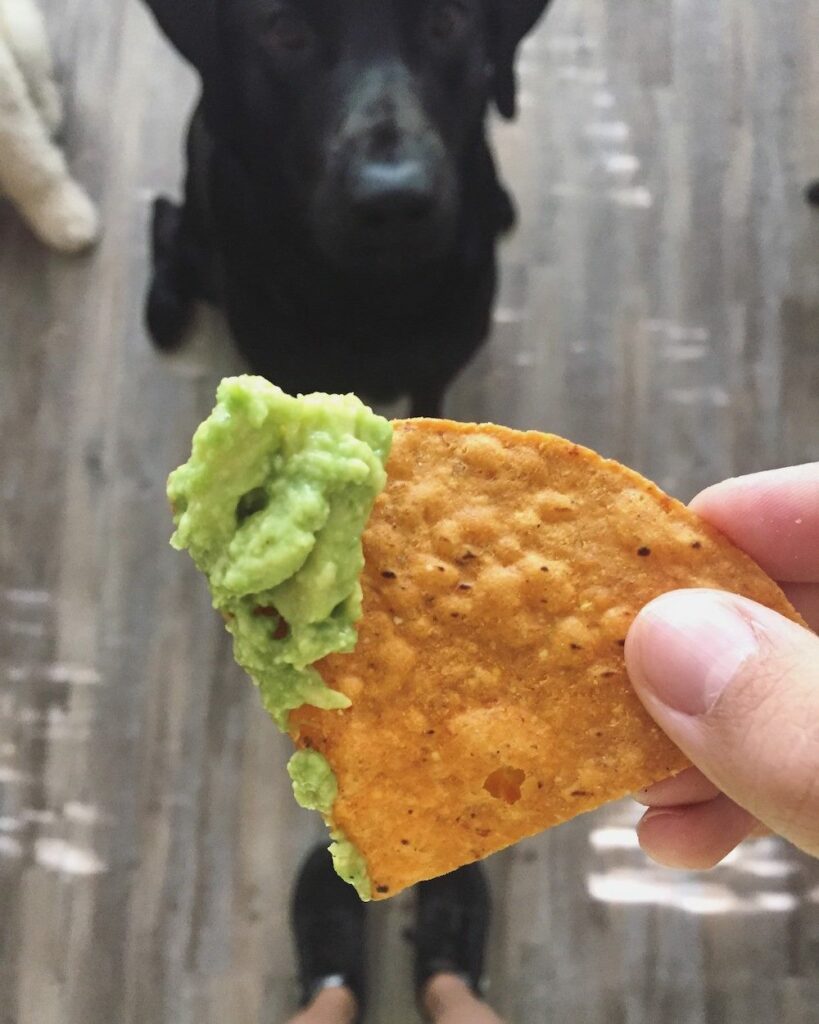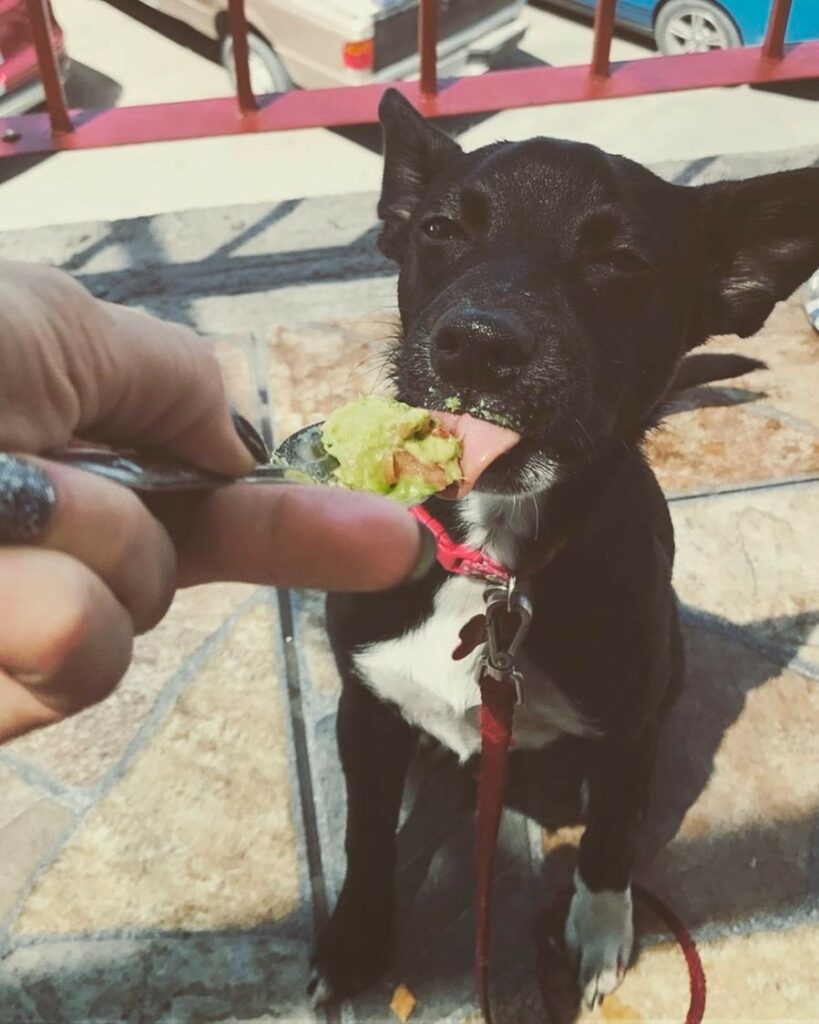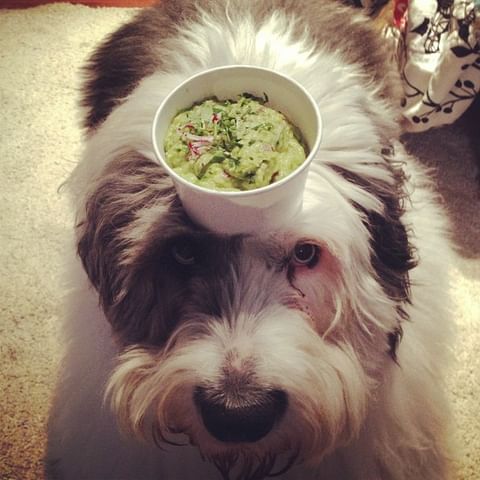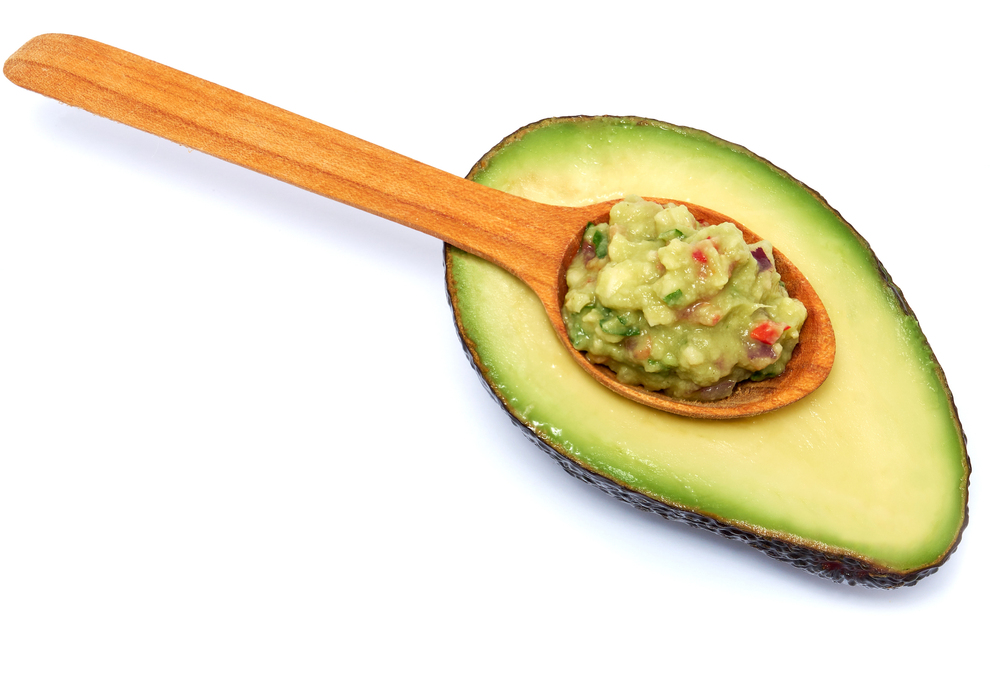We can’t deny how tasty guacamole is; what’s Taco Tuesday without it? But before you go ahead and let your furry friend try some, you may wonder whether it’s beneficial for your pooch or not. So, can dogs eat guacamole?
Dogs can eat guacamole in small quantities if it doesn’t contain any onions, lemon, garlic, and salt. These ingredients contain allergens and toxins in them and can cause harm to your canine buddy. However, plain guacamole is safe for your pooch and can even provide some benefits for it.
Do you want to learn more about guacamole and its effects on your pooch? Please keep reading as I’ve explained these and more in this article.
Is Guacamole Good For Dogs?

Guacamole is suitable for dogs when it doesn’t contain any condiments that will cause harm to your pooch.
Plain guacamole is okay and nutritious for your furry friend. It carries a good source of nutrients, and it can help detoxify your dog’s liver.
What Nutritional Benefits Will My Dog Get From Eating Guacamole?
Since guacamole is made from avocados, it provides all the nutrients an avocado contains. Thus, guacamole is a good source of fiber, potassium, vitamin E, vitamin C, vitamin B6, folate, and magnesium.
Fiber
Guacamole is an excellent source of fiber for your furry friend. Fiber is perfect for your dog because of the good it does for its digestive tract. Very little fiber in guacamole is indigestible, but it helps aid food movement in the bowel and provides solid fecal matter.
On the other hand, soluble fiber serves as food for bacteria in the gut of your pooch, preventing them from feeding on the intestines. Furthermore, they help regulate the metabolism rate in your dog by slowing down the digestion process when the need arises.
Potassium
Guacamole is also a rich source of potassium. In dogs, potassium is critical in maintaining fluid balance, which prevents your dog from frequent dehydration. Potassium is also essential for proper nerve function. It aids the transmission and reception of signals, neurotransmitters, and nerves in your canine’s body.
Furthermore, your dog’s muscles require potassium for normal contraction and relaxation. Studies have also shown that potassium helps to promote heart health and prevent bone disease in dogs.
Vitamin E
Vitamin E is one of the essential non-soluble vitamins that dogs need. It helps maintain proper cardiovascular health and blood flow in dogs. Furthermore, vitamin E helps keep your eyes in good condition.
Vitamin C
Vitamin C, unlike vitamin E, is a soluble vitamin, and your dog requires it in more amounts. vitamin C helps to strengthen your dog’s immune system, protecting it from many diseases. Furthermore, vitamin C helps keep your dog’s heart healthy by promoting proper blood flow and pump speed.
Also, vitamin C plays a minor part in repairing worn-out tissue. Just one-fourth of a spoon of guacamole provides your pooch with 25 mg of vitamin C, about a tenth of its daily requirement. So, plain guacamole is an excellent addition to your dog’s daily diet in the right amounts because of its rich vitamin C content.
Vitamin B6
Vitamin B6, or pyridoxine, is one of the essential vitamins that your growing pup needs. It performs many functions ranging from generating glucose to hormone regulation and many other functions.
This vitamin is also responsible for activating quick immune response and proper nerve function in your furry friend. So for every avocado in guacamole, there is about 0.5 mg of beneficial vitamin B6 for your pooch.
Folate
Vitamin B9, or Folate, present in guacamole, is critical for normal functioning in your pup. In enough amounts, it helps to build your pooch’s RNA and DNA, which are vital in giving your dog’s cells function.
Furthermore, it helps break down triglycerides in food consumed by your pooch. It also helps to improve proper brain function in canines.
Magnesium
Magnesium is a crucial nutrient in dogs because it controls the energy levels in your dog’s body. Magnesium is used up to produce energy in your dog’s cells. Furthermore, it aids muscle movement and bone development in canines.
Luckily, guacamole contains a substantial amount of magnesium, enough to provide these benefits to your dog.
Does Guacamole Help Detoxify My Dog’s Liver?
When eaten in the correct quantity, plain guacamole can detoxify your dog’s liver. As you know, guacamole is made from avocados. These avocados contain glutathione, a chemical that helps to destroy cancer-causing carcinogens in the liver.
Carcinogens are pretty dangerous in dogs, from causing lung cancer to skin cancer, leukemia, and even colon cancer. They are potentially fatal and can be challenging to get rid of in your animal.
Luckily, guacamole contains a lot of glutathione and will help your pooch naturally detoxify its system and get rid of these carcinogens.
Is Guacamole Bad for Dogs?

Guacamole isn’t typically bad for dogs; however, it can be dangerous when it contains certain condiments such as garlic, lemon, onion, and salt.
On the other hand, plain guacamole is safe for dogs to consume and can even provide several benefits, as aforementioned. However, how often do you eat plain, unflavored guacamole?
So, are you curious about the harmful effects this kind could have on your canine buddy? Well, keep reading as I’ll explain this here.
What Makes Guacamole Bad For Dogs?
It’s worth noting that plain guacamole eaten in the right amount isn’t bad for dogs. However, guacamole flavored with garlic, onion, lemon, salt, and other ingredients can be bad for your dog.
Also, if your dog overeats guacamole, it can, in turn, do more harm than good. Join me as I explain these below.
Garlic
Guacamole often has minor amounts of garlic in it. As it does in most foods, garlic enhances the taste of guacamole by a whole lot and makes it palatable. However, for dogs, it can be hazardous.
Garlic belongs to a class of vegetables called alliums, like onions and some other fruits that grow in bulbs. These alliums contain thiosulfate, a chemical that’s not toxic to humans but can cause harm to dogs.
So, if the guacamole that you give your dog contains any garlic in it, it could end up causing harm to your dog.
Onion
Like garlic, onions contain thiosulfate, although in lower amounts. Nonetheless, if guacamole has onion in it, it could cause reactions due to thiosulfate.
Dogs can’t perfectly digest thiosulfate, and when it enters your dog’s bloodstream from the guacamole it eats, it can cause anemia and lead to other potentially fatal conditions.
Lemon
Some guacamole has a dash of lemon in them. While it’s not bad for humans, lemon can be dangerous for dogs. This is because lemons, like other citruses, contain psoralens.
Psoralens are chemical substances that dogs react to adversely. While mild reactions can range from diarrhea to vomiting, severe reactions to psoralen can lead to tremors and breathing difficulty in dogs.
If you don’t want your dog to suffer from this, it’s best to check the guacamole to see if it contains any lemon.
Salt
Guacamole usually contains a lot of salt. While this isn’t generally bad for us, it’s pretty harmful to our dogs. Salt can cause dehydration in canines when it excessively reacts with water molecules in their body.
Furthermore, excessive salt can form kidney stones. These stones will reduce the kidneys’ efficiency in filtering blood and making urine. Moreover, they can cause severe pain in your pooch and eventually lead to bladder problems.
In addition, given that the kidney controls blood flow, its improper functioning can cause issues in your dog’s cardiovascular system, such as hypertension.
Fat
You’ve probably heard that guacamole contains good monounsaturated fat because it comes from avocados. And that’s true. Guacamole contains oleic acid, a kind of fat that doesn’t accumulate quickly in the body. It also contains beta-sitosterol, a nutrient that helps to kill off cholesterol.
However, as you may know, too much of everything is terrible. Dogs tend to be sensitive to extra levels of fat in their blood. Too much fat can easily cause issues for them.
One of the most threatening issues fat from guacamole can cause in dogs is pancreatitis. Pancreatitis is a condition where excess fat from fatty food consumed by canines enters the pancreas and prevents it from functioning correctly.
When dogs have pancreatitis, their pancreases become swollen and cause severe abdominal pain. If immediate medical attention is not provided for your pup in this condition, its pancreas will begin to digest itself.
How Much Is Too Much Guacamole For Dogs?
A guacamole dish compromising more than two avocados is too much for your dog in a day.
As aforementioned, it will lead to a continuous deposit of fat in its system and cause many issues.
On the other hand, guacamole made from one average-sized avocado is enough for your dog per day. It will provide the necessary nutrients and won’t cause any harm to your furry friend.
How Do I Know If My Dog Has Eaten Too Much Guacamole?
There are several ways you can tell, just by observing your dog closely and paying attention to these behaviors:
- If your dog has eaten too much guacamole.
- If it has lost an appetite to eat other food.
- If it begins to vomit.
- If it starts reacting to some ingredients in the guacamole.
- If it suddenly has diarrhea.

Appetite Loss
A common indicator of excessive food consumption in dogs is a lack of appetite. For example, when your pooch has eaten more guacamole than it should, its body will warn it to stop consuming more. In that state, even enticing foods won’t appeal to your dog anymore.
Vomiting
Like a sudden loss of appetite, vomiting is a prevalent expression of over-fullness in dogs. So when your dog begins to throw up after eating guacamole, it’s a sure indicator that it’s consumed too much.
Puking can also mean that your dog’s system is reacting to one of the condiments in the guacamole. In this case, it’s best to check the guacamole for any of the spices I mentioned earlier.
Tremors
Tremors are triggered by reactions to toxins and allergens in dogs. For example, if your furry friend starts to spasm and jerk uncontrollably, it may result from eating guacamole with garlic, lemon, or a spice that’s toxic to it.
General discomfort
If your dog displays signs of discomfort, such as whimpering and whining after eating guacamole, it indicates that it has consumed more than it should have. It may be suffering from severe abdominal pain in such situations, so it’s best to give it as much care as possible.
Sudden Quietness And Changes In Demeanor
If your dog has suddenly become too quiet after having some guacamole or has stopped being as active as it was, it may have eaten more than necessary. Dogs often lose their cheerfulness when they eat too much food; they tend to want to stay alone and are usually down in such situations.
So, when you notice this after your dog has had some guacamole, you should know that it’s had too much.
What To Do If My Dog Takes Too Much Guacamole?
If your dog has eaten too much guacamole, it’s best to take it to a vet. At the vet clinic, expert vets can adequately diagnose what’s wrong and provide efficient healthcare to tackle any anomaly.
Furthermore, as a first-aid measure, if your dog is suffering from diarrhea after eating some guacamole, it’s best to provide oral rehydration therapy before taking it to the vet.
Also, if your dog has started having tremors while reacting to substances in the guacamole, you should dial the vet poison emergency hotline if the vet clinic is too far from you.

How Do I Stop My Dog From Eating Guacamole?
The easiest way to stop your dog from eating guacamole is by keeping it out of its reach. So when you want to have a taco with some dip, keep your dog away from the guacamole as best as you can.
If your dog tries to eat some, tell it no with a stern face. It will not want to have some after that.
On the other hand, if you aim to reduce the amount of guacamole your furry friend eats, you should make conscious efforts to cut down the amount of guacamole you expose it to. That way, it will have no other option than to eat the amount available.





